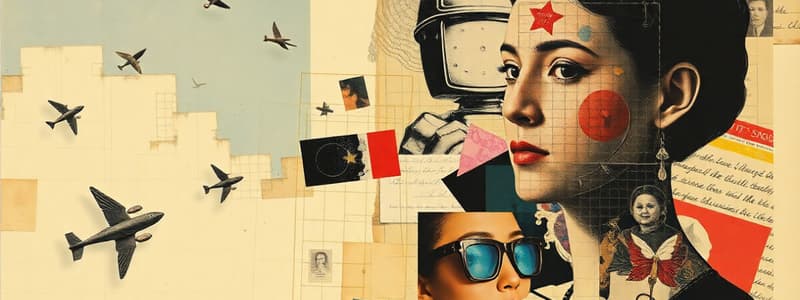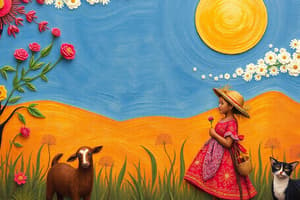Podcast
Questions and Answers
Which of the following does NOT define contemporary art?
Which of the following does NOT define contemporary art?
- Art of “now”
- Art that incorporates various styles and influences
- Art that is produced by living artists
- Art that follows conventions (correct)
Which of the following is a theatrical performance blending song and speech?
Which of the following is a theatrical performance blending song and speech?
- Sarswela or Zarzuela (correct)
- Bodabil
- Senakulo
- Komedya
What type of balance is described by a mandala that arranges elements around a central point?
What type of balance is described by a mandala that arranges elements around a central point?
- Asymmetrical
- Crystallographic
- Symmetrical
- Radial (correct)
Which of the following is NOT a technique in printmaking?
Which of the following is NOT a technique in printmaking?
Which element of music determines key signatures?
Which element of music determines key signatures?
What characterizes contemporary art?
What characterizes contemporary art?
Which element of music relates to the speed at which a musical piece is played?
Which element of music relates to the speed at which a musical piece is played?
Which of the following is a recognized classification of art forms?
Which of the following is a recognized classification of art forms?
What refers to the specific channel or tool used to convey a message in art?
What refers to the specific channel or tool used to convey a message in art?
Which of the following is NOT considered an element of art?
Which of the following is NOT considered an element of art?
Which of the following techniques involves manipulating materials to create a desired effect in visual art?
Which of the following techniques involves manipulating materials to create a desired effect in visual art?
The concept of 'harmony' in music relates to what characteristic?
The concept of 'harmony' in music relates to what characteristic?
What is the term for artworks that focus on collaborative and often community-driven processes?
What is the term for artworks that focus on collaborative and often community-driven processes?
Flashcards are hidden until you start studying
Study Notes
History and Definition of Art
- Art is a diverse spectrum of human expression encompassing various forms, materials, and purposes.
- Contemporary art breaks traditional conventions, emphasizing innovation and diversity in artistic expression.
- Key periods in Philippine art history trace influences from indigenous, colonial, and modern movements.
- Classical Realism highlights strong representation, with proponents striving for representation and perfection in form.
- Modernism emerged in the Philippines with a break from traditional art forms, emphasizing new ideas and aesthetics.
- The Triumvirate of Philippine Modern Painting includes significant artists who shaped contemporary movements.
Art Forms and Contemporary Art
- Art forms are categorized into Visual, Performing, Literary, and Applied Arts, each with unique characteristics and purposes.
- Characteristics of contemporary art include being site-specific, collaborative, interactive, process-based, and integrative.
- Philippine art classifications distinguish between Fine Art, Folk Art, and Commercial Art, reflecting cultural and commercial influences.
Elements and Principles of Art
- Elements of art consist of Line, Shape, Form, Space, Texture, Value, and Color, which serve as the building blocks for artistic composition.
- Principles of art include Balance, Emphasis, Contrast, Harmony, guiding how elements are arranged to create meaning or aesthetic appeal.
Media and Techniques
- The medium in art refers to the tools or channels used to convey messages, ranging from physical materials to digital formats.
- Techniques lie in manipulating materials to achieve desired artistic effects, with visual art techniques such as Drawing, Painting, Sculpture, and Printmaking.
- Performing arts techniques encompass Dance, Music, and various advertisement strategies.
Exam Review Questions
- Contemporary art is distinguished by its departure from conventions, highlighting innovation and diverse influences.
- A theatrical performance combining song and speech is identified as Sarswela or Zarzuela.
- A mandala signifies a radial balance, where elements are organized around a central point.
- Hatching is characterized as a drawing technique, not pertaining to printmaking methods like etching and lithography.
- Tonality in music is crucial for determining key signatures, influencing the emotional and structural elements of compositions.
True or False Questions
- Acoustic and electric guitars exhibit distinct tone qualities, confirming the statement as false.
- A smartphone camera is categorized as a digital medium, contradicting traditional medium classification.
- Value is accurately defined as the lightness or darkness of a color.
- Tertiary colors arise from the mixture of secondary colors, disproving the notion of primary color combinations.
- Victorio Edades holds the title of Father of Philippine Modern Painting, affirming the statement as true.
Studying That Suits You
Use AI to generate personalized quizzes and flashcards to suit your learning preferences.




